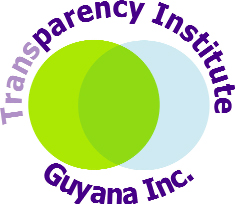“We must not fail the billions who look to the international community to fulfill the promises of the Millennium Declaration for a better world. Let us keep the promise.” UN Secretary General Ban Ki-moon.
With the release by the Government of Guyana of information on Guyana’s achievements thus far in respect of the Millennium Development Goals the Institute wishes to share Transparency International’s assessment of the corruption challenges for the millennium.
“Our new millennium opened with heads of state pledging to honour the right of all people to freedom, dignity and basic living standard without hunger or violence. These fundamental ideals were distilled into what became the Millennium Development Goals. Representing the most significant promise ever made to help the world’s most vulnerable people, leaders pledged by 2015 to end poverty, put every child in school and win the battle against HIV/AIDS among other development goals.
Significant progress has been made toward achieving some of these goals. But this has been uneven. Without a major push forward, many of the goals are likely to go unmet in most regions of the world.
One major obstacle threatening the fulfillment of the Millennium Development Goals (MDG) is corruption.”
According to the UN News Centre the MDG report indicates that Burundi, Rwanda, Samoa, Togo and Tanzania are just some of the countries that have attained or are on their way to attaining the goal of universal primary education, one of the MDGs.
 Progress has also been made in Benin, Ethiopia, Mozambique, Mali, and Niger among others where enrollment has increased by 25% 1999-2009.
Progress has also been made in Benin, Ethiopia, Mozambique, Mali, and Niger among others where enrollment has increased by 25% 1999-2009.
However according to Transparency International (TI) nearly half of all parents surveyed in seven African countries reported paying illegal fees to send their children to school. Healthcare workers in Moldova claim bribes are demanded for routine care that should be free, while scholarship programmes in Bangladesh allegedly require “informal payments”.
These acts of corruption come in many forms explicit such as embezzlement and implicit where payments are made for goods and services.
Achieving the MDGs requires tremendous commitment by those who have undertaken the obligation but it will also require the injection of significant resources into those areas identified for development as well as the creation of and adherence to transparent processes to ensure the avoidance of abuse.
There are specific identifiable areas where corruption has the potential of flourishing. Some are provided below. These areas have been identified by Transparency Intl as critical areas of vulnerability.
Public procurement- according to TI Trillions are spent every year worldwide on publicly funded projects – everything from schools and hospitals, to roads and bridges, to power plants and dams. Enormous amounts of money flowing from government budgets through procurement create ideal opportunities for corruption. Contracts can be awarded without fair competition and politically connected companies can be favoured over competitors. Companies within the same industry can rig their bids, so each company gets a piece of the pie. TIs research has shown that corruption can add up to 50 per cent of a contract’s value.
Judiciary- According to TI a functioning judiciary is the guarantor of fairness and a powerful weapon against corruption. But people’s experiences in many countries fall far short of this ideal. In some countries the majority of those who had contact with the courts encountered bribe demands, and the total amount paid in bribes can reach staggering proportions. Court personnel are paid off to slow down or speed up a trial, or to make complaints go away. Judges are also subject to pressures from above with legislators or the executive using their power to influence the judiciary, starting with skewed appointment processes.
Natural Resources- According to TI three and a half billion people live in countries rich in oil, gas or minerals, according to World Bank estimates. The tragedy is that so many of the countries endowed with great natural resource wealth remain home to some of the world’s poorest communities. When resource income is siphoned off, only the interests of an elite few are served. Natural resource management, whether of fossil fuels, minerals or logging, often falls victim to inefficiency and outright theft.
The Transparency Institute Guyana Inc is pleased to learn of the achievements made in Guyana in respect of the MDGs. However based on the foregoing the Institute is acutely aware that corruption can potentially impact on the realization of the goals and urges greater focus on identifying and exposing those involved in corrupt practices particularly in public service.
Persons interested in becoming involved in the work of TIGI can contact the Secretariat on 664-3639 or by email to trans.inst@yahoo.com or on Facebook to Transparency Institute Guyana Inc





